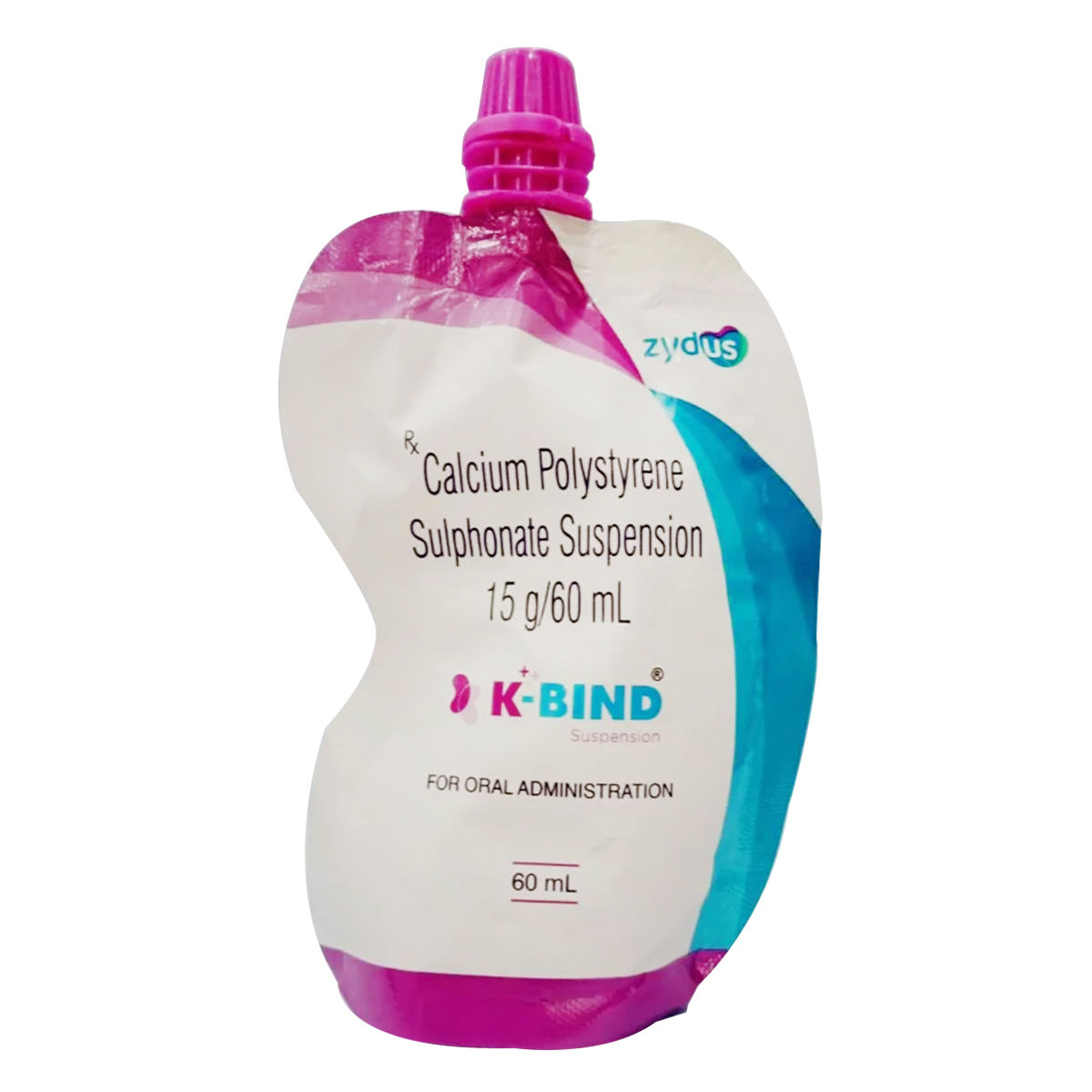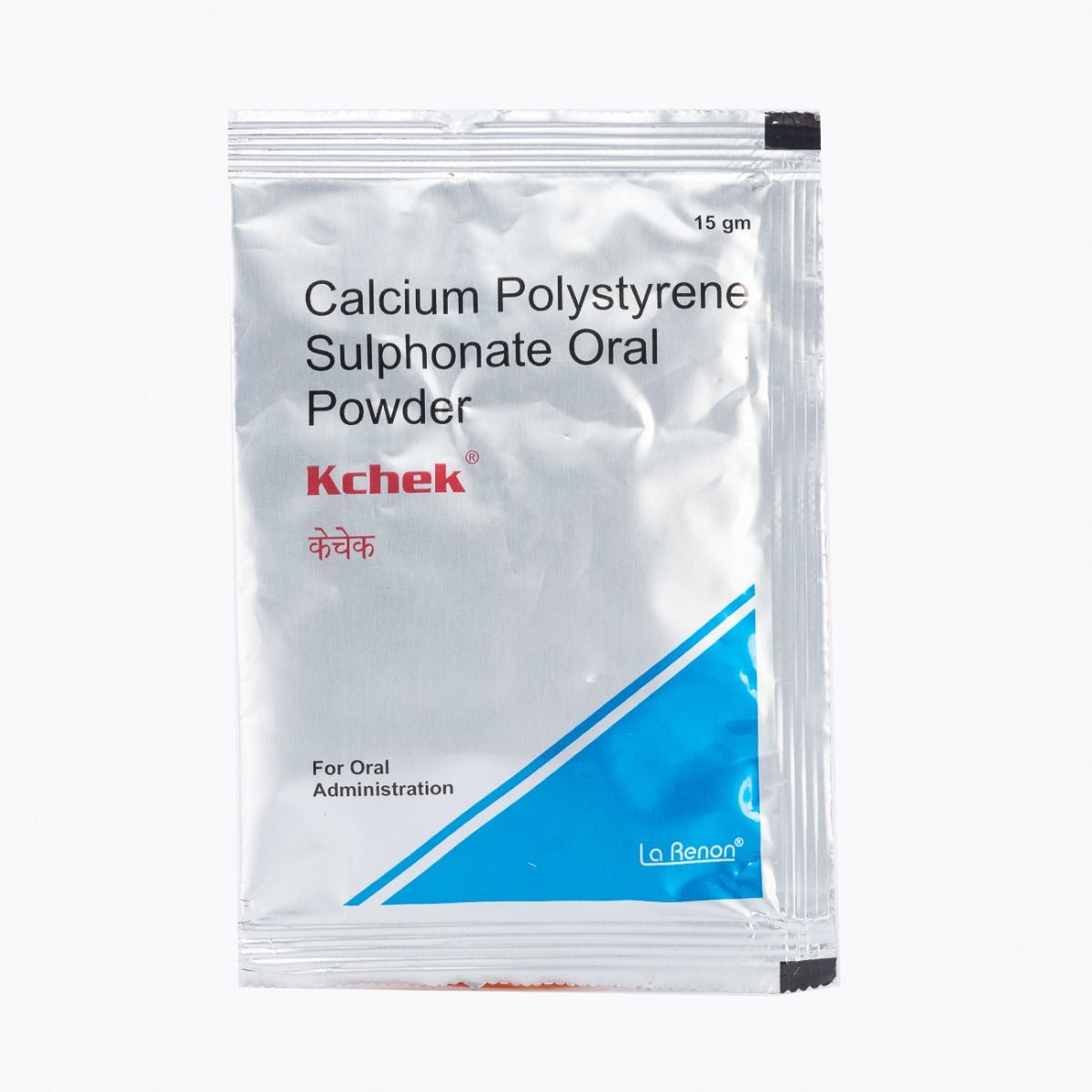K-Hold Powder Sachet 16 gm


₹97.2*
MRP ₹108
10% off
₹91.8*
MRP ₹108
15% CB
₹16.2 cashback(15%)
Free Delivery
With Circle membership
(Inclusive of all Taxes)
This offer price is valid on orders above ₹800. Apply coupon PHARMA10/PHARMA18 (excluding restricted items)
Know Your Delivery Time
Provide Delivery Location
K-Hold Powder Sachet is used in patients with kidney problems and on dialysis to treat and manage hyperkalaemia. This medicine works by eliminating excess potassium from the system to restore normal levels. Common side effects include hypokalaemia, hypocalcaemia, muscle cramps, tiredness, muscle weakness, and cramps.
Available Offers

Secure Payment

India's Most Trusted Pharmacy

Genuine Products
Composition :
Manufacturer/Marketer :
Consume Type :
Return Policy :
Expires on or after :
About K-Hold Powder Sachet
K-Hold Powder Sachet is used to treat something called 'hyperkalaemia'. It is used in patients with kidney problems and on dialysis. Hyperkalaemia (High Potassium) is a medical problem where you have too much potassium in your blood. Your body needs potassium. It is a key vitamin that may be found in various foods. Potassium aids in the proper functioning of your nerves and muscles, including your heart. Unfortunately, having too much potassium in your blood might be dangerous. It has the potential to cause major cardiac issues.
K-Hold Powder Sachet contains calcium polystyrene sulphonate, which is administered to decrease potassium's blood levels in the body, reducing the risk of 'hyperkalaemia' due to high potassium levels. It works by eliminating excess potassium from your system in order to restore your levels to normal.
K-Hold Powder Sachet is administered by a healthcare professional. Do not self-administer this medicine on your own. You should complete the course of the treatment as per the doctor's advice based on blood test results. In some cases, you may experience hypokalaemia and hypocalcaemia, muscle cramps, tiredness, muscle weakness, cramps, or a change in heart rate. Most of these side effects of K-Hold Powder Sachet do not require medical attention and gradually resolve over time. However, if the side effects persist or worsen, please consult your doctor.
If you are allergic to K-Hold Powder Sachet or any other medicines, please tell your doctor. If you are pregnant or breastfeeding, think you may be pregnant, or plan to have a baby, ask your doctor or pharmacist for advice before using this medicine. The dose is also worked out for children according to how much the child weighs. Children and babies must be given a suitable dose. Children and newborns may experience severe constipation if too much is given. While you are taking this medicine, your doctor may perform routine blood tests on you. This is done to determine the quantities of salts in your blood, such as potassium, sodium, calcium, and magnesium.
Uses of K-Hold Powder Sachet
Directions for Use
Medicinal Benefits
K-Hold Powder Sachet belongs to a group of medicines called 'ion exchange resins.' It contains calcium polystyrene sulphonate, which is administered to decrease potassium's blood levels in the body, thereby reducing the risk of 'hyperkalaemia' due to high potassium levels. It works by eliminating excess potassium from your system to restore your levels to normal.
How K-Hold Powder Sachet Works
Storage
Side Effects of K-Hold Powder Sachet
- Hypokalaemia
- Hypocalcaemia
- Muscle cramps
- Feeling tired
- Confused
- Having muscle weakness
- Cramps or a change in heart rate
- Feeling sick
- Being sick
- Constipation or diarrhoea
- Stomach upset
- Pain in your gut
- Loss of appetite
What if I have taken an overdose of K-Hold Powder Sachet
Drug Warnings
If you are allergic to K-Hold Powder Sachet or any other medicines, please inform your doctor. If you are pregnant or breastfeeding, think you may be pregnant, or plan to have a baby, ask your doctor or pharmacist for advice before using this medicine. The dose is also worked out for children according to how much the child weighs. Children and babies must be given a suitable dose. Children and newborns may experience severe constipation if too much is given. While taking this medicine, your doctor may perform routine blood tests on you. This is done to determine the quantities of salts in your blood, such as potassium, sodium, calcium, and magnesium. Before taking K-Hold Powder Sachet, inform your doctor about your medical history and all medications you are currently taking in order to rule out any potential side effects.
Drug-Drug Interactions
Drug-Drug Interactions
Login/Sign Up
Drug-Food Interactions
Drug-Food Interactions
Login/Sign Up
Habit Forming
Therapeutic Class
K-Hold Powder Sachet Substitute

K Bind Powder Sachets 15 gm
by Others
₹9.54per tabletK-Bind 15G Suspension 60 ml
by Others
₹2.70per tabletKchek Powder 15 gm
by AYUR
₹8.16per tabletK-Stall Powder 15 gm
by AYUR
₹5.94per tabletK-Down Sachet 15.3 gm
by Others
₹4.26per tablet
Product Substitutes
Alcohol
Caution
You are recommended not to consume alcohol along with K-Hold Powder Sachet to avoid unpleasant side effects.
Pregnancy
Caution
There is limited information available on using K-Hold Powder Sachet in patients with pregnant women. Your doctor will weigh the benefits and potential risks before prescribing them to you. Please consult your doctor.
Breast Feeding
Caution
There is limited information available on using K-Hold Powder Sachet in patients with pregnant women. Your doctor will weigh the benefits and potential risks before prescribing them to you. Please consult your doctor.
Driving
Safe if prescribed
K-Hold Powder Sachet has no or negligible impact on the ability to drive or use machines.
Liver
Caution
If you have a history or evidence of any liver-related diseases, please inform the doctor before taking medicine. Your doctor will weigh the benefits and potential risks before prescribing K-Hold Powder Sachet.
Kidney
Caution
If you have a history or evidence of any kidney-related diseases, please inform the doctor before taking medicine. Your doctor will weigh the benefits and potential risks before prescribing K-Hold Powder Sachet.
Children
Safe if prescribed
K-Hold Powder Sachet can be given safely to children under the supervision of a child specialist. The dose is worked out according to how much the child weighs.
FAQs
K-Hold Powder Sachet is used to treat something called 'hyperkalaemia'. It is used in patients with kidney problems and on dialysis. Hyperkalaemia (High Potassium) is a medical problem where you have too much potassium in your blood.
K-Hold Powder Sachet contains calcium polystyrene sulphonate, which belongs to a group of medicines called 'ion exchange resins. It is used to treat a medical condition known as 'hyperkalaemia.' This occurs when your blood has excessive potassium. It works by eliminating excess potassium from your system in order to restore your levels to normal.
The most common cause of genuinely high potassium (hyperkalemia) is a kidney problem, such as acute kidney failure. Kidney disease is chronic.
Potassium is an essential electrolyte required for various vital functions in our body. However, high potassium levels may lead to complications such as muscle cramps, pain, difficulty breathing, nausea, tiredness, chest pain, and even death.
No, it is a prescribed medication for preventing specific medical conditions such as treating hyperkalaemia. Taking this medication on your own can cause unwanted side effects.
K-Hold Powder Sachet may interact with medicines used to treat Gastroesophageal Reflux Disease (e.g. pantoprazole, esomeprazole). So, it is recommended not to take K-Hold Powder Sachet and antacids medications same time. If necessary, a time gap of 2hours in between two medicines is advisable.
Depending upon the severity of your medical condition, your doctor may prescribe K-Hold Powder Sachet to you daily for a specific duration. However, do not take it endlessly on your own without a doctor's advice.
Unfortunately, it's often difficult to know if you have hyperkalemia (high potassium level) based on symptoms alone. Many people with high potassium levels experience no noticeable symptoms. However, if you experience muscle weakness or numbness, heart palpitations or irregular heartbeat, or feeling unwell, remember that your healthcare provider is there to support you. It's essential to consult with them for guidance and reassurance.
The most reliable way to determine if you have a high potassium level is through a blood test, a trusted and accurate diagnostic tool that can provide you with the information you need for effective management.
K-Hold Powder Sachet may interact with various medications. However, it’s essential to consult with your healthcare provider or pharmacist before taking any new medications while on calcium polystyrene sulfonate. They can help you determine if your current medications could interact with the drug.
Calcium polystyrene sulfonate may cause gastrointestinal side effects, but it doesn't typically cause long-term damage to the gut. If you experience any side effects, it's essential to consult with your healthcare provider. They can assess the severity of the symptoms and recommend appropriate management strategies.
Country of origin
Manufacturer/Marketer address
Customers Also Bought
Disclaimer
Author Details
We provide you with authentic, trustworthy and relevant information


























